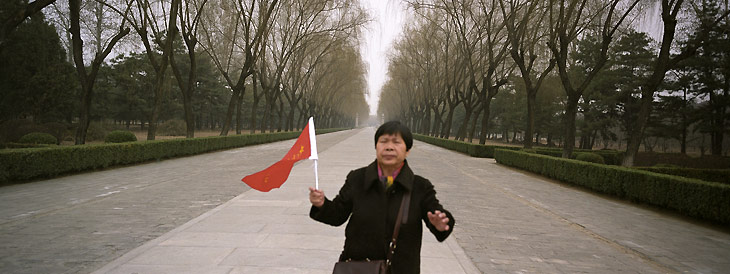
beautyme collections culture cuisine mobility music search
Revolution, I love you
1968 in Art, Politics and Philosophy
Artists: Mladen Stilinović from Croatia, Tamás St.Auby from Hungary, Zofia Kulik from Poland, Stefanos Tsivopoulos from Greece, Oliver Ressler from Austria, Fia-Stina Sandlund from Sweden, Miklós Erhardt from Hungary, Heath Bunting from the UK, Marko Lulić from Austria, Tamás Kaszás from Hungary, Jean-Baptiste Ganne from France and Nancy Davenport from the USA
Exhibition tour:
5 May- 14 June 2008 Center of Contemporary Art, Thessaloniki
12 September - 19 October 2008 Trafó Gallery, Budapest
13 November – 19 December 2008 International Project Space, Birmingham
translocal.org/revolutioniloveyou
40 Years after the Revolution: 40 years after the revolts in 1968 artists, intellectuals, journalists, publishers, politicians,... question again if our society has changed into a global community with a chance to live in freedom as young people in the late 60ies believed in.
The revolts of 1968 can be considered the first global protest movement - it was even the first time that mass media deliver content across national borders. The war in Vietnam wasn't any longer a national theme, the motivation for the protests in Germany had an international impact, and when the heart in France was beating "revolution" the whole world could hear the rhythm: "When parliament is transformed into bourgeois theatre, then bourgeois theatre becomes parliament" was the slogan on a banner hung outside the National Theatre of France, the Odeon, in May 1968.
The curators: ">Revolution, I Love You< is one of the slogans of May ’68 which reminds us of the vitality of the period, the profound desire for change and the faith in the prospect of freedom. The exhibition explores the events of 1968 as a flaring up of freedom and global resistance, focusing on the interaction between street politics, radical philosophy and an explosion of creativity. It examines the ways in which the uprising took shape in Europe, against the background of the opposing economic and political systems in East and West. 1968 is also synonymous with a shift in philosophical attitudes. It was a time when theorists were deeply involved with the protest movements, either on a practical level or through their approach to the intellectual questions to which the uprising demanded answers. The Praxis group of philosophers from Zagreb, for example, brought together pioneering neo-Marxist intellectuals, from Marcuse to Fromm, to discuss the new meaning of revolution. The interaction between philosophy, protest and art was a distinctive feature of the events of 1968, just as the blending of theory, action and art is a powerful force today," Maja and Reuben Fowkes, curators of the exhibition.
Radical philosophers: Herbert Marcuse who discussed the right of humans to revolt in an article written 1965 under the title “Repressive Tolerance” was one of the most important philosophers for the revolution in the late 60ies. In Germany the assassination attempt on Rudi Dutschke - one of the speakers of the revolution - caused the following occupation by revolutionizing students of the publishing house owned by Axel Springer. This was a significant act for the right to freedom of speech.
Check out the video "Herbert's Hippopotamus: Marcuse and Revolution in Paradise" about the life of Herbert Marcuse in San Diego, California; directed by Paul Alexander Juutilainen. The video gives a good insight how Herbert Marcuse polarized people during this time.
Video: Rudi Dutschke about "Revolution"
Rudi Dutschle was the "guru" of the German students in the 1960ies. His ideas come from Frankfurt School philosophers such as Herbert Marcuse, Theodor W. Adorno, Erich Fromm, .... Other prominent philosophers of the Frankfurt School are for example Jürgen Habermas and Walter Benjamin.
On 11th April 1968 he was shot down by Josef Bachmann. He died on 24 December 1979 because of the massive brain damage from the assassination attempt.
If you speak German, don't miss this additional video youtube.com/watch?v=jPmyIT_wphU
The director: "We do not believe the time has come to consign the events of May ’68 to the museum. We are trying to find whatever has retained the vitality of that extraordinary year and can still give meaning to contemporary life. Even if the political causes championed in that month of May, forty years ago, have – in many cases – been utterly lost, the fact remains that society has undergone radical changes. Sexual liberation, the radicalization of the feminist movement, the claiming of equal political rights, the anti-war and green movements have defined, to a great extent, the way we think and act today as actively engaged citizens," Syrago Tsiara, director of the Thessaloniki Centre of Contemporary Art.
more culture>>>

fig.: Fia-Stina Standlund "The Way of Socialism" 2004
The Swedish artist Fia–Stina Sandlund (born in 1973) uses different media (radio, sound pieces, film, performances,...) to explore the social structures of power and the concept of normality, questions existing systems and repudiates all forms of repression and inequality. Fia–Stina Sandlund graduated from Konstfack Stockholm in 2003. She has recently exhibited at The Gothenburg Biennial, Moderna Museet Stockholm and De Appel Amsterdam.